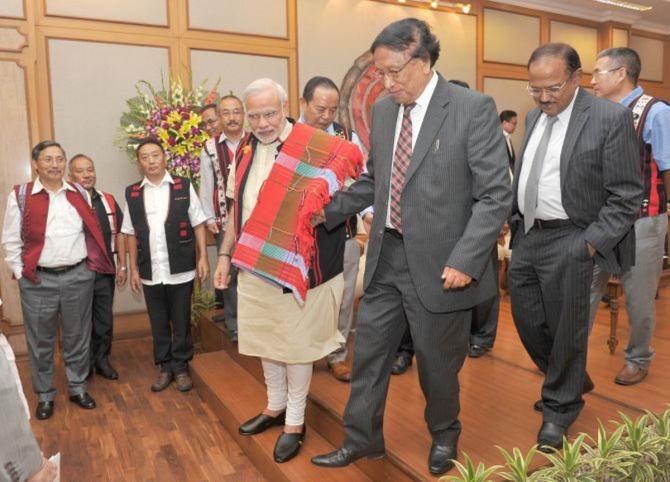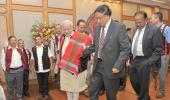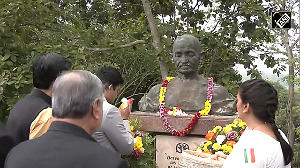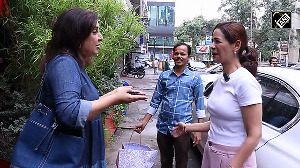'People's expectations were very high.'
'We felt both sides had understood each other.'
'But the removal of Article 370 triggered apprehensions within the Naga people.'
Rashme Sehgal reports.

With the NSCN-IM threatening a resumption of 'armed violent conflict', Home Minister Amit A Shah finally agreed to meet a delegation of the Nagaland cabinet led by Chief Minister Neiphiu Rio and his two deputy chief ministers T R Zeliang and Y Patton last week.
The crux of the problem which NSCN-IM leaders have been highlighting repeatedly is their unhappiness with the present government appointed interlocutor, retired Intelligence Bureau officer K N Mishra who has been asked to speak to them after being given the status of a 'representative'.
Chief Minister Rio conveyed to Shah the apprehension felt by the NSCN-IM cadre led by T Muivah, who is both their chief political negotiator as also party general secretary, when Mishra conveyed to them that 'no record was available of the Government of India competencies that were submitted by GoI interlocutor Governor of Nagaland R N Ravi' in the course of his dialogue with members of this organisation.
"The GoI competencies were submitted on May 8, 2018 and they were responded to (by NSCN-IM) on January 2 2020," says Zeilang.

Then Nagaland governor R N Ravi was the last interlocutor for the talks but after being shifted to Tamil Nadu, the Centre downgraded the status of the talks by appointing Mishra only as a representative.
The Centre has been holding negotiations with NSCN-IM since 1997 following a ceasefire agreement and went on to ink the Framework Agreement on August 3, 2015.
The Framework Agreement was signed by Muivah and Ravi and copies of which were exchanged in New Delhi on August 3, 2015, in the presence of Prime Minister Narendra Modi, then home minister Rajnath Singh, National Security Adviser Ajit K Doval, and top NSCN-IM leaders, triggered hopes for a quick settlement of the decades-long armed conflict.
The GoI also started parallel talks with the working committee of Naga National Political Groups in 2017 and signed the Agreed Position the same year.
Muivah, who also claims to be prime minister of the self-styled government of the People's Republic of Nagaland, alleged that the GoI had 'deliberately betrayed' the letter and spirit of the Framework Agreement by refusing to recognise and acknowledge the 'Nagalim sovereign national flag' and the 'Nagalim sovereign national constitution'.
By Nagalim, the NSCN-IM refers to all contiguous Naga-inhabited areas of Nagaland, Manipur, and Arunachal Pradesh.
This demand for a separate constitution and flag had resurfaced with greater force following the Modi government's decision to abrogate Article 370 by which Jammu and Kashmir enjoyed the notional autonomy of having their own flag and constitution.
But once this reversal took place, there was little likelihood of the GoI agreeing to a similar demand by any other group including the NSCN-IM demand and this is precisely what Home Minister Shah conveyed to Rio and his team.
Says Zeilang, "The home minister conveyed to us that there can be only Constitution and one flag within a country and this position would not be reconsidered."
Zeilang points out that both parties need to find a middle ground. He also emphasises that "the competencies of both the GoI and NSCN-IM must be discussed clause by clause in order to arrive at a middle path."

So far, the NSCN-IM is not willing to budge from its demand of a separate flag and constitution. This group also claims they have lost their faith in Mishra and want him to be replaced by a proper interlocutor in order to ensure that the ongoing Naga political dialogue is elevated to ministerial level.
Muivah and his group have repeatedly insisted that 'Nagas were not Indians, Nagas were sovereign and any settlement could be reached only on the basis of the fact that this is a settlement between two sovereigns'.
Author and human rights lawyer Nandita Haksar, who was closely associated with the peace talks, points out that Muivah's stand has been that the two significant agreements signed by the NSCN-IM -- the Amsterdam Joint Communique with the Atal Behari Vajpayee government in 2002 and the Framework Agreement with the Modi government in 2015 -- officially recognised and acknowledged 'Nagalim sovereignty'.
According to Muivah, the agreements also recognised that the Naga issue was a political conflict between two sovereign entities and therefore the Naga conflict was not an internal matter of India.
Muivah claims that through the Framework Agreement, the two sides had agreed upon 'sharing sovereign power' in a 'new relationship'. "But the GoI had not issued any official statement on this matter up till now," Haksar points out.
Sources within the NSCN-IM did not mince words when they said that they "smelled mischief was afoot" and expressed disbelief at how GoI competencies could disappear out of the blue.

Muivah has also been demanding a 'third party intervention' (read a neutral international body) to end the stalemate over the Framework Agreement it had signed with the GoI.
The political development is not sudden but a culmination of the ambiguity that gripped the Naga talks five years ago, in 2019, when dialogue came to a halt over the two contentious issues of a separate flag and constitution for Nagalim. Several rounds ot talks held from 2022 onwards have prove inconclusive.
The problem from the start was that neither the GoI nor the NSCN-IM divulged the content of the Framework Agreement leaving the Nagas and the public questioning about what the content of this final settlement was and how it would be translated on the ground.
Two years after the signing of the Framework Agreement, the GoI initiated a parallel dialogue with the Naga National Political Group, a conglomeration of seven other Naga rebel groups, after the two sides signed an 'Agreed Position' in 2017.
The Naga National Political Group's consistent stand has been that the states derive space to exercise sovereign powers from the Constitution of India through the Central List, the State List, and the Concurrent List.
According to the Naga National Political Group working committee, the political dialogue concluded on October 21, 2019, and only the final accord remained to be signed.
"So far the NSCM-IM have been adamant. I believe this problem needs an out of box solution," says Deepak Dewan, an observer and analyst on the North East.
"The GOI can arrive at a conclusion with them by calling it Naga customary law and not the Constitution. They can be told they can use a flag for cultural purposes but not as a Constitutional right."
"The problem is that the NSCM-IM has not disbanded its cadre which continue to operate from designated camps," adds Dewan. "We must not forget that no insurgency can survive without the support of the local people and these different groups continue to get money and manpower from the locals."
"Also, earlier the interlocutor from the GoI was reporting to the PMO and not to the home ministry as has happened after Mishra's appointment," says Dewan.
"When the Framework Agreement 2015 was signed, we thought everything was settled," says Neingulo Krome, secretary general, Naga People's Movement for Human Rights. "People's expectations were very high. We felt both sides had understood each other. But the removal of Article 370 triggered apprehensions within the Naga people."
"The subsequent Nagaland Resolution was passed with the full approval of the GoI who had invited Naga leaders for talks. Everything is there on the record," adds Krome. "But talks have been downgraded since which is why Naga leaders have been threatening to call off the cease fire and are also asking for third party intervention."
"We have received no official statement from the PMO. The doors are still open and it will all depend on what step the GoI will take. The bottom line is that the Naga leaders are not willing to talk to Mishra anymore," emphasises Krome.
Muivah believes that Prime Minister Modi, who had supervised the signing of the Framework Agreement, has 'turned cool as the years keep going away otherwise what is making him go slow in implementing the FA, which is his own brainchild?'
One of the reasons, Nagas believe, could be because major mineral resources, including petroleum are to be found in different parts of Nagaland. But Muivah insists these resources 'belongs to us' and nobody can be allowed to exploit them.
Observers question whether anything positive can come out of these peace talks.
"The only thing that can be achieved is a good economic package which will bring some real development to the Naga inhabited areas which are some of the remotest in the country," says Nandita Haksar.
"There are villages where there is no electricity, no water and no toilets. A whole generation of Naga youth have left and taken jobs all over India, many returned penniless in the wake of the pandemic," Haksar adds.
If the GoI does not take immediate steps to ameliorate their condition, the Naga people will get increasingly alienated from both the NSCN and the GoI.
One trend visible is how young people are growing fundamentalistic in their attitudes and not willing to tolerate outsiders including minorities that are found within Naga society.
The GoI can scarcely afford to allow another state in the north east to go the Manipur way which has been witnessing incessant sectarian violence for over one year now.
Feature Presentation: Rajesh Alva/Rediff.com











